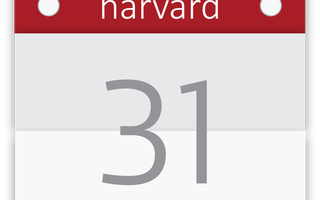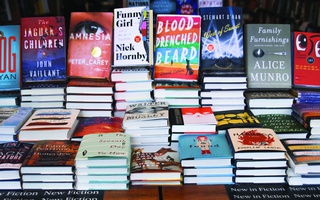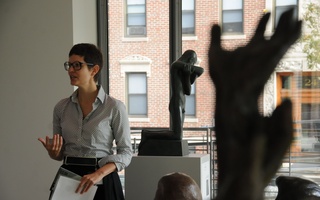With response rates to telephone polls dwindling in the single digits and inherent demographic problems persisting with Internet polling, it may be time to reconsider the central role that polling plays in the American political process, Harvard History professor Jill Lepore argued at the Kennedy School of Government on Thursday.
“American politics is adrift in a sea of polls—this year that sea is deeper than ever before and darker,” Lepore said. “[Donald] Trump is a creature of that sea, but so are we. Turning the press into pollsters has made American political culture Trumpian: frantic, short-sighted, sales-driven, and anti-democratic.”{shortcode-11866e98e05fe65e62fd18dee3e80f03bd2867f2}
While response rates to public opinion polls have plummeted from more than 90 percent in the 1930s to the low single digits today, polls are paradoxically affecting American elections more than ever, Lepore said. This summer, the first Republican debate hosted by Fox News averaged the results of five national polls to select the 10 participants in its prime-time debate; the first Democratic debate on CNN had a similar cutoff for participants, requiring a 1 percent polling average in three polls to be invited.
“Many reputable pollsters found this decision unsupportable,” Lepore said, adding that Fox News had used polls conducted more than 460 days before the election.
The decline of traditional forms of polling, however, does not necessarily mean that one needs to turn immediately to data science and new technological methods, according to Lepore. In fact, Lepore argued that more advanced means of conducting surveys may undermine rather than enhance the political system.
“Data science is dazzling, but it can’t solve the biggest problem in public opinion polling, because that problem is neither methodological nor technological—it is in fact political,” Lepore said. “Pollsters rose to prominence in the United States by claiming that measuring public opinion is good for democracy—but what if it’s bad?”
In particular, Lepore challenged the audience to think about the implications of a hypothetical technology that would let members of Congress perfectly measure the opinions of the electorate.
She imagined a scenario in which a member of Congress was about to vote on a piece of legislation they considered critical but which they had learned was unpopular with their constituents, who were preparing to withdraw campaign funds.
“So if I vote against my convictions but in line with my constituents as read by this technological tool, is that democracy?” Lepore asked.
Lepore’s remarks came as part of the 26th Theodore H. White Lecture on Press and Politics organized by the Kennedy School’s Shorenstein Center on Media, Politics, and Public Policy. Directly preceding Lepore’s lecture, author and Guardian columnist Gary Younge was presented with the 11th annual David Nyhan Prize for Political Journalism.
—Staff writer Luca F. Schroeder can be reached at luca.schroeder@thecrimson.com. Follow him on Twitter @lucaschroeder.
Read more in University News
Harvard Lands Fourth in Economist’s First College RankingsRecommended Articles
-
Political Trend to be Shown in Two Day Crimson Straw VoteAt 8.45 o'clock tomorrow the two day CRIMSON presidential poll of the University will start in an effort to determine
-
 Harvard Today: October 31, 2014
Harvard Today: October 31, 2014 -
 Of Paper and Pixel: Book as a Medium
Of Paper and Pixel: Book as a Medium -
 Harvard Today: November 6, 2015
Harvard Today: November 6, 2015 -
Yea, Nay, or Meh?Electing leaders “who will exercise their conscientious judgment” to protect “the real good of the rest of the community” remains the basic imperative of American democracy.













